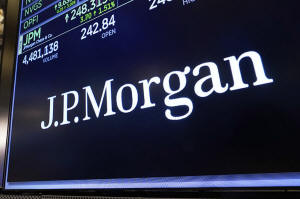JPMorgan posts strong second quarter numbers, though Dimon warns of
tariff, geopolitical risk
[July 16, 2025] By
MATT OTT
WASHINGTON (AP) — JPMorgan’s second-quarter profit fell to $15 billion
in second quarter, but the New York bank beat Wall Street expectations.
CEO Jamie Dimon on Tuesday touted another strong performance by the
bank, particularly its markets division, where revenue rose by 15% to
$8.9 billion.
JPMorgan earned an adjusted $5.24 per share in the period, beating the
$4.48 analysts were calling for but down from last year’s $6.12 per
share. Excluding the one-time items, JPMorgan earned $4.96 per share in
the period.
The bank's profit was off significantly from the same period a year ago,
largely because JPMorgan cashed in $7.9 billion worth of its holdings in
Visa in last year's second quarter.
Dimon said the U.S. economy remained resilient in the second quarter,
highlighting tax reform and the potential for more deregulation.
However, he noted that plenty of risks remain, including trade
uncertainty, geopolitical conflicts and federal government deficits.
“The finalization of tax reform and potential deregulation are positive
for the economic outlook, however, significant risks persist — including
from tariffs and trade uncertainty, worsening geopolitical conditions,
high fiscal deficits and elevated asset prices,” Dimon said in prepared
remarks.
Dimon often weighs in on global and economic issues that go beyond the
scope of banking. He’s seen as the banker that Washington and global
leaders can turn to for advice, solicited or unsolicited. His comments
tend to reverberate through Washington and Corporate America.

JPMorgan's net interest income, the difference between the interest the
bank takes in on its loan portfolio and the interest in pays out on
customer deposits, rose 2% to $23.3 billion. That was slightly below
expectations.
The country’s biggest banks have benefited from higher interest rates
for the last two years, but many analysts were expecting the Federal
Reserve to cut its benchmark lending rate up to two times this year,
which would generally be expected to ding the banks' bottom line.
However, another report Tuesday showed that U.S. inflation rose in June
to its highest level since February as President Donald Trump’s sweeping
tariffs pushed up the costs of a range of goods. Higher inflation would
likely fortify the Federal Reserve’s reluctance to cut its short-term
interest rate, something that Trump has been loudly demanding.
Big U.S. banks — and their shareholders — are also likely to continue to
benefit from dialed down regulation under the Trump administration. That
applies particularly to lower capital requirements, the amount of cash a
bank reserves in the event of an economic calamity.
[to top of second column] |

The logo for J.P.Morgan appears above a trading post on the floor of
the New York Stock Exchange, Thursday, May 1, 2025. (AP
Photo/Richard Drew, File)

Last month, all the major banks passed the Federal Reserve’s annual
“stress tests” of the financial system, but the test conducted by the
central bank was notably less vigorous than it had been in previous
years.
The Fed said it went with a gentler test because the global economy has
weakened since last year, and therefore the test tends to weaken.
Lower capital requirement leaves the banks with much more cash, which
they often use to raise dividends and buy back shares of their own
stock.
JPMorgan, among other banks, raised its dividend and repurchased more
than $7 billion worth of its own stock last quarter.
JPMorgan said as of the end of the second quarter, it was holding $1.5
trillion in cash and marketable securities.
JPMorgan's total managed revenue hit $45.7 billion, also beating
expectations but below last year’s $51 billion. Wall Street was
expecting revenue just under $44 billion.
Shares of JPMorgan were effectively flat before the bell Tuesday, while
broader U.S. markets rose modestly.
Wells Fargo also reported its second-quarter earnings early Tuesday,
beating Wall Street's profit and revenue targets. Wells posted net
income of $5.5 billion in the period. That works out to a profit of
$1.60 per share, beating the $1.41 analysts expected and the $1.33 from
the same quarter a year ago.
However, investors were discouraged by the San Francisco bank's outlook,
particularly its trimmed net interest income guidance, and its shares
fell 3.6% in premarket trading.
Citigroup also beat Wall Street's projections on Tuesday, earning $1.96
per share on $21.7 billion in revenue. Analysts were forecasting profit
of $1.61 per share on revenue of $21 billion.
Citi said it returned $3 billion in capital to shareholders during the
most recent quarter, including $2 billion worth of share repurchases.
Citi shares rose 2.6% before the bell.
All contents © copyright 2025 Associated Press. All rights reserved
 |